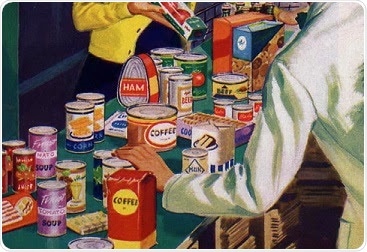
Checkout aisle food policies may reduce junk food intake
Policies that limit what types of food can be shelved in the checkout aisles of grocery stores may successfully curb junk food intake in shoppers, according to a new study published this week in PLOS Medicine by Jean Adams from the University of Cambridge, UK, and colleagues.

Credit: ArtsyBee, Pixabay
A number of UK supermarkets have introduced policies on what food should and shouldn’t be displayed at their checkouts, with stores pledging to provide healthier checkout foods. In the study, researchers used data on food purchases that had been recorded since 2013 by more than 30,000 households participating in a UK commercial household purchase panel, as well as data spanning 2016 and 2017 from a 7,500 person UK purchase panel. Information from nine large UK supermarket chains—six of which had introduced checkout food policies between 2013 and 2017 and three of which acted as controls—was included in the datasets.
Introduction of checkout food policies was associated with an immediate 17.3% reduction in purchases of small packages of sugary confectionary, chocolate, and potato crisps per four week span. One year following introduction of such a policy, the researchers found a 15.5% reduction in packages of these common checkout foods purchased per four weeks. Additionally, data on what people eat “on-the-go” rather than only what they bring home revealed that in 2016 and 2017, 76.4% (95% CI: 48.6 to 89.1) fewer small packages of sugary confectionary, chocolate, and potato crisps were bought from stores with checkout food policies.
“Because this is not a trial, we can’t be sure that the changes in purchases we recorded are due to checkout food policies. Nor can we know if there were any other changes in what people bought or ate” the authors say. “However, these policies could help people to eat better.”
Source:































No hay comentarios:
Publicar un comentario